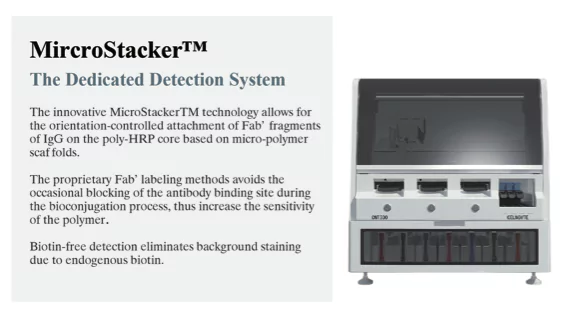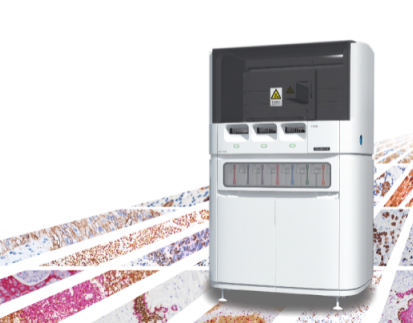Full Automatic IHC Stainer: Promote Precision Medicine
2024-08-22
By admin
Accelerating Biomarker Development with IHC Services
Immunohistochemistry (IHC) plays a pivotal role in developing and validating biomarkers essential for precision medicine. The demand for accurate and reliable diagnostic tools has led to advancements in IHC services that enhance the speed and quality of biomarker development. This not only accelerates research but also facilitates personalized treatment options for patients. With the rising complexity of identifying biomarkers related to diseases, utilizing fully automatic IHC stainers has become increasingly important in laboratories worldwide.
Importance in Precision Medicine
Precision medicine aims to customize healthcare tailored to individual patient characteristics. This approach heavily relies on identifying specific biomarkers that correlate with disease pathways. IHC services enable the detailed analysis of tissue samples, providing critical insights into the cellular microenvironment. Full automatic IHC stainers streamline the staining process, ensuring consistent and reproducible results that contribute significantly to the accuracy of biomarker identification. Thus, the integration of automated systems is essential in advancing precision medicine.
Detailed Procedure Overview
The staining process using a full automatic IHC stainer typically involves several critical steps, including fixation, embedding, sectioning, and staining. The machine handles multiple samples simultaneously to improve efficiency. This automation minimizes human error and variability in staining intensity, ensuring that results are comparable and facilitating high-throughput analyses. Laboratories that employ such automated systems are better equipped to manage large volumes of samples, essential for robust biomarker research.
Advancements in Biomarker Identification
Recent advancements in IHC technology enhance the identification of biomarkers associated with various diseases. Combining multiplex staining techniques with full automatic IHC stainers facilitates the simultaneous visualization of multiple antigens within a single tissue section. This capability not only improves the efficiency of identifying biomarkers but also enriches the understanding of disease pathology by revealing spatial relationships between different cellular components. Consequently, laboratories focusing on precision medicine can achieve higher specificity and sensitivity in their analyses.
Cutting-Edge Technology of Full Automatic Multiplex IHC Stainer
The development of cutting-edge technology in IHC services, particularly with full automatic multiplex IHC stainers, marks a significant leap in laboratory capabilities. These systems integrate sophisticated hardware and software that address the complexities of modern histopathology.
Precision Temperature Control
One prominent feature of full automatic IHC stainers is precision temperature control. Maintaining optimal temperatures during the staining process is crucial for achieving reproducible results. These systems are designed with advanced thermal management features that consistently regulate temperature throughout the staining protocol, ensuring that enzymatic reactions occur under ideal conditions.
Utilization of Individual Heating Units
Equipped with individual heating units for each staining station, full automatic IHC stainers can independently control the temperature of each sample. This allows for tailored temperature settings according to the specific requirements of various antibodies and staining protocols. The result is enhanced staining quality and reduced background noise, further supporting accurate biomarker detection.
Antigen Retrieval Optimization
Another crucial aspect of these advanced IHC stainers is their ability to optimize antigen retrieval procedures. Effective antigen retrieval is fundamental in exposing target epitopes, which may be masked during fixation. Automatic systems streamline this process by offering various retrieval options tailored to specific tissue types and antigens, allowing researchers to achieve optimal staining results consistently.
Enhancing Research with Celnovte
Celnovte is at the forefront of providing innovative solutions for the histopathology community. Its broad business scope includes the design and manufacture of high-quality IHC stainers and related reagents, ensuring that laboratories are equipped with the tools necessary for effective analysis. Through its advanced technology, particularly the full automatic multiplex IHC stainer, covering models 300, 330, and 360, Celnovte enhances the research capabilities of laboratories engaged in biomarker discovery and validation.
Overview of Full Automatic IHC Stainer
CNT300 Full Automatic Multiplex IHC Stainer
The CNT300 Full Automatic Multiplex IHC Stainer exemplifies the state-of-the-art technology available for tissue analysis. This well-engineered system is designed to handle multiple staining protocols in a single run, reducing turnaround times and enhancing throughput.
Features and Capabilities
Revolutionize your IHC lab workflow with the CNT300-Automatic IHC Slide Stainer, an advanced system that redefines the standards of automation, efficiency, and precision in immunohistochemistry. This cutting-edge machine is designed to support continuous operation, allowing researchers to load up to 30 slides across three separate frames simultaneously, significantly boosting throughput and reducing processing time. With its fully automated process, the CNT300 takes care of everything from slice drying and deparaffination to antigen retrieval and beyond, ensuring a standardized and streamlined workflow that elevates lab performance.
One of the key highlights of the CNT300 is its meticulous monitoring capabilities. The system precisely tracks dosage levels, timing, and any abnormal behavior during the staining process, guaranteeing accurate and reproducible results. Moreover, its green design incorporates environmentally friendly solutions that minimize the generation of hazardous waste, thereby reducing waste treatment costs and contributing to a sustainable laboratory environment.
Efficiency is at the core of the CNT300’s design, as evidenced by its ability to process up to 30 slides in just 2.5 to 4 hours. This rapid turnaround time is facilitated by 30 independent heating platforms that maintain optimal temperatures for each slide, ensuring consistent and optimal staining conditions. Furthermore, the system allows for customization of reagent handling volumes, enabling researchers to achieve precise staining quality tailored to their specific needs.
Integration in Modern Laboratories
The CNT300 is a true multifaceted solution, supporting a wide range of applications including IHC, Multiplex IHC, and ISH. Its full automation extends to every step of the staining process, from baking and deparaffinization to antigen retrieval, blocking, detection, and counterstaining, ensuring a seamless and error-free workflow. Real-time monitoring and tracking, coupled with label identification via both camera and Infrared, eliminate human errors and further enhance reliability.
Economical and flexible, the CNT300 offers cost savings through its ability to dispense as little as 80ul of reagent, significantly reducing consumable costs. Additionally, its flexibility is unmatched, with the capability to continuously load and unload slides during runs, allowing for uninterrupted operation. Multiple devices can be controlled by a central computer, facilitating centralized management and optimization of lab resources. Customizable staining protocols and compatibility with hospital LIS systems further extend its versatility.
Lastly, the CNT300’s eco-friendly design is exemplified by the use of separate waste containers for hazardous (DAB waste) and non-hazardous waste, which not only simplifies waste management but also helps laboratories save both time and money spent on waste disposal. In conclusion, the CNT300-Automatic IHC Slide Stainer is the ultimate solution for labs seeking to optimize their IHC workflow, enhancing efficiency, precision, and sustainability.
Conclusion and Future Directions
The future of immunohistochemistry, particularly through the lens of full automatic IHC stainers, is undeniably bright. These technological advancements not only enhance existing laboratory workflows but also open new avenues for research in precision medicine. As the field continues to evolve, researchers will increasingly rely on automation and advanced algorithms to interpret complex data, making significant contributions to medical science.
Potential Applications in Precision Medicine
The applications of automated IHC staining technologies like the CNT300 extend to various realms of precision medicine, from oncology to personalized drug development. By allowing the simultaneous detection of multiple biomarkers within tissue samples, such technologies provide comprehensive insights into tumor microenvironments. This multifaceted understanding is key to devising individualized treatment strategies that consider each patient’s unique pathological profile.
Furthermore, advancements in simultaneous multiplex staining offer promising avenues for assessing the efficacy of targeted therapies in real-time, enhancing clinical decision-making. Such capabilities will be instrumental in fostering a tailored approach to patient care, making precision medicine a more attainable goal across a wide array of diseases. As research progresses and automated systems become more integrated into standard practices, the potential for improved patient outcomes through precision medicine will only continue to grow, ultimately redefining the landscape of diagnostics and treatment.







